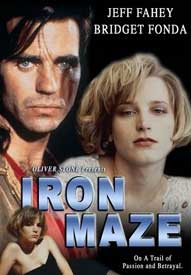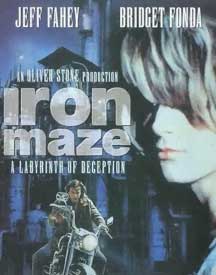Jeff Fahey stars as a sexy down-&-out ex-steel worker cum bellboy in a dying steel town near Pittsburg. Bridget Fonda is the fashion model returning from Japan with a young Japanese businessman as her husband, regretting her marriage, & eager to cuckold her spouse. Hiroaki Murakami is the businessman whose tycoon father bought the factory & surrounding blocks of the town so that his son could pursue his dream of tearing everything down to replace it with a miniature Disneyland, a dream that makes him bitterly hated by unemployed steelworkers who thought the Japanese investors were going to reopen the plant. J. T. Walsh plays the police chief who must find out what really happened when the young businessman is found beaten into unconsciousness & left for dead on the steel mill grounds.
 The story is told in flashbacks from many points of view while the police chief interviews the key players. Between the lying, & the limited perspectives of each witness in turn, "truth" becomes subjective, though eventually the truth is found in something of an anticlimax. The story is told in flashbacks from many points of view while the police chief interviews the key players. Between the lying, & the limited perspectives of each witness in turn, "truth" becomes subjective, though eventually the truth is found in something of an anticlimax.
The structure of the film is taken from a classic short story by Ryuonosuke Akutagawa, "In a Grove," which was also the basis of Akira Kurosawa's masterpiece, Rashomon (1950). In Kurosawa's version, the lies & varied perspectives of all witnesses (including of the ghost of the murdered man when interviewed by the magistrate with the assistance of a psychic) never can be resolved into a coherent truth, because where people are involved, there is never only one truth.
Iron Maze appealed to me predominantly for its relationship to Rashomon. It got condemnatory reviews from critics who didn't know the source material & didn't like the rather slow structure or much else about Iron Maze. I found it fascinating though scarsely exciting, but I suspect most viewers would find it dull if not aware of or intrigued by how a Pennsylvania steel town manages to fit into a retelling of a story of medieval Japan.
Assessed apart from its source material -- & it should've been more capable of standing on its own legs -- the story seems forced into its new mileau. The marriage between the elegant if slightly cruel young Japanese businessman, & the cute but sleezy American woman, is not the least bit believable. Between nothing in common & the language barrier, they can barely talk to each other. I doubted she'd even be acceptable as a mistress of a tycoon's son, certainly not a wife.
The only thing she has in common with her husband is they're both fashion-challenged. He wears an oversized ice-cream suit that makes him look like a nurd gangster, & she, though allegedly a fashion model who married enough money to dress well, dresses like a white trash beauty who hopes to seduce the preacher in her cheap-ass Sunday best. This is the fault of a lousy or absent costume designer rather than an extension of the characters. By comparison Fahy seems to have brought his own clothes & looks fine except when in the laughable bellboy suit.
Apart from Walsh's investigating police chief who gets increasingly annoyed by all the lying, no one quite behaves like actual people. The subplot about rough-&-tumble Fahey becoming the older brother or father figure to the practically orphaned Mikey (Gabriel Damon) has greater believability than the main story.
The boy in emulation of his hero played by Fahy has let the pinky-nail of his right hand grow long & keeps it shiny with fingernail polish. This was never explained & when Fonda asked Fahy about the fingernail, he shrugs & has no reason for it. I really wanted this explained because I remember when I was very young, my dad let one nail grow in exactly that manner. Someone once told me it was done by gangsters who used the nail as a cocaine spoon, but so far as I know, my dad was so radically anti-drug that when a fellow merchant marine came on ship with a piece of opium black tar, my dad ripped it out of his hand & threw it through a port window, to the horror of his shipmate who'd spent a fortune to buy it. My dad did hang out with gangsters when he was young, but I suspect the affectation of the long nail was one of several little things he picked up in the Navy during or immediately after the Pacific War; my dad & his two brothers spent a lot of time in Okinawa & picked up a few odd mannerisms that I later observed in yakuza movies. If anyone knows for certain the meaning of the long nail, e-mail me about it! The movie provides no clue.
In the film's favor are the location settings in a crumbling steel mill & the streets of a boarded-up steelworkers' town. This provides a truly pitiful environment for these characters to act out their sins & lies. The idea that an entire neighborhood could suddenly be the private property of Japanese business interests should've had a more profound impact on the story, but it is mainly about the cuckholding & resulting tensions between the girl's husband & her unlikely lover. Occasionally the cinematography gets really good showing the decaying town & the mazy factory, but most of the cinematography is cheap & flat.
The director previously made the first-rate animated feature film Twilight of the Cockroaches (1987), but he has no other films to his credit, which seems odd. His career has been mainly as a television producer. Co-produced by Japanese & American investors, including Oliver Stone, I suspect Iron Maze was intended as an arty thriller, but it comes off as a telefilm.
copyright © by Paghat the Ratgirl
|

 The story is told in flashbacks from many points of view while the police chief interviews the key players. Between the lying, & the limited perspectives of each witness in turn, "truth" becomes subjective, though eventually the truth is found in something of an anticlimax.
The story is told in flashbacks from many points of view while the police chief interviews the key players. Between the lying, & the limited perspectives of each witness in turn, "truth" becomes subjective, though eventually the truth is found in something of an anticlimax.